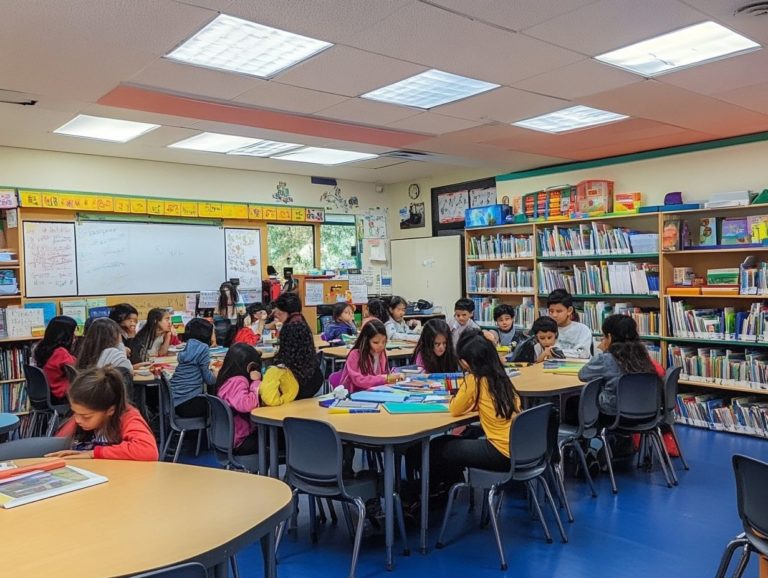the benefits of language immersion programs
Language immersion programs provide a transformative way for you to learn a new language, enveloping you in a world filled with native speakers and rich cultural experiences.
These programs come in many forms, tailored to various age groups and learning preferences. They offer a multitude of benefits, from heightened language proficiency to enhanced cognitive skills.
Discover the incredible world of language immersion programs and see how they can change your life! This article highlights their advantages, guides you on how to select the ideal fit, offers tips for maximizing your success, and addresses common challenges you may encounter.
Whether you are a student embarking on this educational adventure or a parent contemplating the journey for your child, valuable insights await you.
Contents
- Key Takeaways:
- What are Language Immersion Programs?
- Benefits of Language Immersion Programs
- Choosing the Right Language Immersion Program
- Maximizing the Benefits of Language Immersion Programs
- Challenges and How to Overcome Them
- Frequently Asked Questions
- What are the benefits of language immersion programs?
- How does language immersion help improve language proficiency?
- What cognitive skills are improved through language immersion?
- What role does cultural awareness play in language immersion programs?
- Do language immersion programs have any long-term benefits?
- Are language immersion programs suitable for all ages?
Key Takeaways:

Language immersion programs offer a unique opportunity for students to become fluent in a new language through immersive and interactive learning experiences. Aside from improved language proficiency, these programs also promote cultural and global awareness, allowing students to better understand and appreciate other cultures. Research has shown that the effectiveness of immersive language learning can enhance cognitive skills such as problem-solving and critical thinking, leading to overall academic success.
What are Language Immersion Programs?
Language immersion programs stand out as innovative educational initiatives that offer you an immersive experience in a language beyond your native tongue. These programs are expertly designed to help you be able to speak two languages and enhance your overall language skills.
Through teaching in two languages, you’ll encounter a unique curriculum that promotes fluency and comprehension while also weaving in cultural elements that nurture your identity and heritage.
In regions like Minnesota and Sacramento, schools such as Saint Paul Public Schools and Granite School District have effectively implemented these programs, driven by dedicated educators like Elizabeth Villanueva and See Pha Vang. They aim to elevate academic success and strengthen community connections.
Benefits of Language Immersion Programs
Language immersion programs present you with a wealth of benefits that go far beyond merely acquiring a new language. They significantly enhance your proficiency in both your native tongue and the new language, showcasing the impact of language immersion on fluency.
Additionally, these programs promote cognitive skills and cultural awareness. They not only sharpen your communication abilities but also nurture your self-esteem and a robust sense of identity, especially for heritage learners within diverse communities, including Latino populations.
Studies have demonstrated that students engaged in these immersive experiences gain a deeper understanding of academic concepts and cultivate invaluable life skills that pave the way for their overall success.
Improved Language Proficiency
One of the standout benefits of language immersion programs for you is the significant boost in your language proficiency, especially in vocabulary, reading, writing, and communication skills elements critical for academic success.
These programs often weave in interactive teaching strategies like collaborative projects and experiential learning, allowing you to engage with the language in real-world contexts. By utilizing a curriculum that focuses on thematic units and cultural relevance, immersion experiences enrich your vocabulary acquisition and deepen your understanding.
Your writing fluency is nurtured through regular journaling and creative expression. Structured peer-to-peer communication opportunities enhance your conversational skills. This holistic approach not only speeds up your language development but also fosters a genuine enthusiasm for learning, preparing you for the challenges of an increasingly interconnected world.
Explore language immersion programs today to unlock your potential!
Cultural and Global Awareness

Language immersion programs play a vital role in enhancing your cultural and global awareness. They allow you to connect with diverse communities and appreciate various identities through immersive experiences.
By engaging with native speakers and participating in cultural activities, these programs encourage you to embrace the varied traditions and practices that define different societies. You might explore vibrant festivals, indulge in culinary arts, or experience traditional music associated with the languages you are studying. This not only celebrates your own heritage but also values that of your peers.
This varied approach boosts your academic performance and strengthens your personal identity, helping you understand yourself within a global context.
These interactions spark respect for diversity, making education more vibrant and essential today!
Enhanced Cognitive Skills
Participating in language immersion programs significantly enhances your cognitive skills. They also provide the benefits of language learning games, equipping you with critical thinking abilities essential for academic success and overall development.
Research consistently supports that these programs improve language proficiency and foster better problem-solving skills. They increase creativity and enhance comprehension abilities.
A 2017 study published in the journal *Cognitive Development* revealed that bilingual students often excel in tasks requiring flexible thinking and pattern recognition. This enables them to tackle challenges from unique perspectives.
Findings from a 2020 report by the American Council on the Teaching of Foreign Languages indicate that immersion participants exhibit superior executive function, which is the ability to manage tasks and focus on what’s important.
Clearly, engaging in these immersive experiences lays a solid foundation for cognitive growth and adaptive learning.
Choosing the Right Language Immersion Program
Selecting the ideal language immersion program is critical. It demands thoughtful evaluation of numerous factors.
Ensure that it aligns with your educational needs, aspirations, and honors your cultural heritage.
Factors to Consider
When evaluating language immersion programs, several critical factors deserve your attention:
- Effectiveness of the curriculum
- Level of community involvement
- Teachers’ experience in bilingual education
As you explore your options, consider the curriculum design. Ensure it integrates cultural elements and real-life applications, as this can significantly enhance your learning experience.
Teacher qualifications are equally essential. Experienced educators well-versed in bilingual teaching techniques can profoundly influence your outcomes.
Community engagement is a key element to consider. Programs that actively connect with local resources and cultural events create a richer learning environment. For example, a program that collaborates with local cultural organizations can offer students hands-on experiences that deepen their understanding.
Responsiveness to student needs ensures personalized attention and support, fostering an inclusive atmosphere where you can truly thrive.
Maximizing the Benefits of Language Immersion Programs

To maximize the benefits of language immersion programs, you need intentional strategies that foster success both in and out of the classroom.
Prioritizing practice and cultivating community support can make all the difference in your language-learning journey. For example, joining a local language club can provide additional speaking opportunities and help reinforce what you’ve learned.
Tips for Success
To succeed in your language immersion program, practice regularly. Use available resources and seek community support to boost your skills.
Set aside dedicated time each day for practice. Talk with peers, read fun books, or enjoy films in your target language to improve your listening skills.
Your family can help by encouraging discussions at home. Incorporate the new language into daily routines, like during meals or outings.
You can also explore local language clubs or cultural events. These offer great opportunities to interact with native speakers and build your confidence.
Challenges and How to Overcome Them
Language immersion comes with its challenges. You need effective strategies to tackle them.
This is especially true for English learners and those navigating new cultural landscapes.
Common Obstacles and Solutions
You may face emotional and academic challenges in language immersion programs. These can impact your learning experience.
Feelings of isolation or anxiety might arise from the unfamiliar environment. Complex concepts can also lead to frustration.
To overcome these issues, build support systems like peer mentorship and tailored tutoring. Engaging the community through local events can create a supportive network.
For instance, organize language exchange events. These not only help you practice but also allow you to make new friends.
Frequently Asked Questions

What are the benefits of language immersion programs?
Language immersion programs provide numerous benefits, including improved language proficiency, enhanced cognitive skills, cultural awareness, and the benefits of using native speakers in immersion for increased job opportunities.
How does language immersion help improve language proficiency?
By immersing oneself in a language, individuals are constantly exposed to real-life situations where they must communicate in the target language. This intensive exposure helps improve language proficiency by forcing learners to think and communicate in the language on a daily basis.
What cognitive skills are improved through language immersion?
Studies have shown that language immersion programs can improve cognitive skills such as problem-solving, critical thinking, and memory retention. This is due to the constant mental stimulation and challenges that occur when learning a new language, highlighting the connection between language immersion and confidence.
What role does cultural awareness play in language immersion programs?
Language immersion programs not only teach the language but also the culture of the target language. By learning about different customs, traditions, and ways of life, individuals gain a deeper understanding and appreciation for other cultures, highlighting the role of community in language immersion.
Do language immersion programs have any long-term benefits?
Yes, language immersion programs have long-term benefits such as improved job opportunities. In today’s globalized world, being bilingual or multilingual is a highly desirable skill in many industries. Understanding the psychology of language immersion can give individuals a competitive edge in the job market.
Are language immersion programs suitable for all ages?
Yes, language immersion programs are suitable for all ages. Some programs are specifically designed for young children, while others cater to adults. It is never too late to learn a new language and reap the benefits of language immersion programs.






